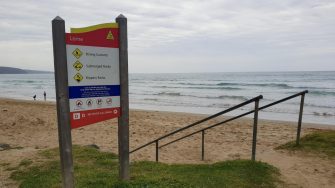
Synopsis
Rip currents are the major hazard facing recreational beachgoers accounting for hundreds of drowning fatalities globally each year. In Australia, an average of 21 people drown in rip currents each year and over 10,000 are rescued. Recently, there has been an interest in examining the social science aspect of rip current rescues, specifically who is getting rescued, why and how.
The Australian Research Council Linkage Project between UNSW BEES and Surf Life Saving Australia published several papers examining the experiences of rip current survivors based on the results of online and hardcopy surveys. The study also conducted 75 in-depth interviews with rip current survivors that have yet to be fully analysed.
Interviews provide a fascinating and powerful research tool for examining scientific problems, in this case, the risk of drowning by rip currents. There are numerous themes that can come out of analysing the rip current interviews, but perhaps the most important one is panic. The panic response tends to dominate when someone gets caught in rip currents and trying to manage and negate this response is now a major goal of Surf Life Saving Australia and beach safety organisations around the world.
The ‘Lessons from Rip Current Survivors’ project aims to provide a better understanding of the panic response of people caught in rip currents to assist the development of improved rip current safety education material in the future. Students will gain experience using statistical software in relation to analysing and coding interview transcripts.
Aims
The primary aim of this project is to examine the variety of factors, based on real and actual experience, that contribute to people getting caught in rip currents. It also looks at people’s reactions once caught in a rip current and how it influences how they get out of a rip current. This information will be used to help future educational efforts related to the rip current hazard.
Student benefits
You get to tackle a problem of growing importance (beach safety and rip current drownings) that will be of national and global interest. The experience of working with a real-world problem is extremely valuable when it comes to getting future jobs in the coastal sector.
You’ll gain the following skills:
- data analysis
- writing
- science communication
- presenting.
You’ll also have the chance to work with a team of postgraduate students who are studying similar topics that you can bounce ideas off. You’ll be strongly encouraged to publish your honours work in an international journal, which will help enormously if you choose to apply for a scholarship to undertake postgraduate studies.
Supervisors work closely with honours students and are interested in honours’ projects. Students will get plenty of guidance, although they won’t be spoon-fed. Prof. Brander has a very good track record of supervising students to first-class honours results.
Supervisors: Prof. Rob Brander, A/Prof. Wendy Shaw
Get involved
To learn more about this project, contact Prof. Rob Brander.
E: rbrander@unsw.edu.au
T: +61 2 9385 2899
